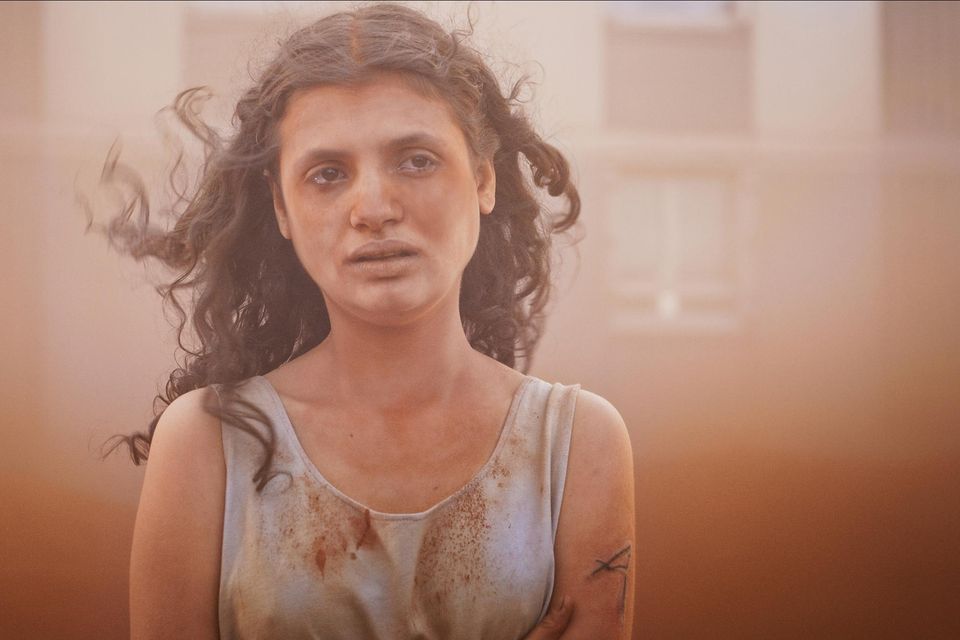
With Alpha, Julia Ducournau director trades in her trademark maximalist body horror for something more grounded.
Julia Ducournau’s ascent is something to behold. In the span of five years, the French director went from premiering her first feature at Cannes’ Critics Week sidebar (the grisly cannibal coming-of-age horror Raw) to winning the Palme d’Or with the turbo-charged Titane. This is all to say that perhaps a comedown was inevitable for one of cinema’s most exciting purveyors of body horror. It’s hard to follow up a film where a woman fucks a car, after all. After taking home Cannes’ top prize, Ducounau could ostensibly do whatever she wants—and so it’s a fascinating choice that her third feature Alpha is a dour swing, tackling family, addiction and pandemics in an AIDS allegory filled with originality. But the film is missing the pressure cooker energy that made her work so excitingly fresh.
There’s a bleakness that never relents in Alpha, not in the least because of its desaturated colour palette, as if life has been sucked out of the world in every sense. Alpha (Mélissa Boros) comes home from a party with an “A” tattooed on her shoulder from a shared needle. Fearing an infection, her single nameless doctor mother (Golshifteh Farahani) gets her tested for a virus that has been plaguing France. Those afflicted with the illness see their bodies harden into marble until their heart turns to literal stone. Alpha’s own deterioration is mirrored in the arrival of her uncle Amin (Tahar Rahim, speaking few words but devastating in his physicality) an addict hoping to go cold turkey in their apartment.
Ducournau trades in her trademark maximalist body horror for something more grounded. Less sickening, there’s more an eerie beauty to it all. Victims of the virus gradually transform into petrified marble statues. And as Alpha and Amin suffer through their respective illnesses overnight, their bodies jerk and contort in sync like a grotesque choreographed dance.
The details about the epidemic are vague: How widespread is this disease? How long has it been around? Ducournau is less interested in answers, perhaps to the film’s detriment in how confounding it can be, but there are shades of effective world building. Alpha’s mum and her colleague (Emma Mackey) are the few doctors working in a short-staffed hospital that’s overflowing with patients. Crowds of desperate ailing people are locked outside, while dozens of calcifying patients are crammed into a sickly yellow ward, their beds virtually side-by-side. It’s clear that this debilitating illness isn’t being taken seriously.
Alpha’s wound is still fresh when she goes back to school, and the film is at its strongest when it’s grounded in her ostracisation from her classmates. Kids are cruel, and these ones scrape their desks across the floor to get as far away from her as possible. The casual cruelty of Alpha’s classmates culminates when a bully attacks her in the swimming pool, and in the ensuing chaos, she knocks her head against the wall—her isolation demarcated in the bloody water. As a metaphor for the stigma against sickness, it’s all fairly surface-level but Ducournau’s imagery is effective at its most straightforward.
But this is not a straightforward film. Ducournau plays with non-linear storytelling, drawing parallels in two time periods that are seemingly only indicated through Farahani’s hair, either curly or straight. Those duelling timelines begin to merge in ways that become confusing—even more so when the film calls into question what’s real and what isn’t. By the end, it’s all so ambiguous that it softens any emotional impact that Ducournau might be going for. As a sombre exercise in unravelling how a disease can destroy a life, Alpha is a moving tragedy, but it threatens to get lost in its lofty ideas.





